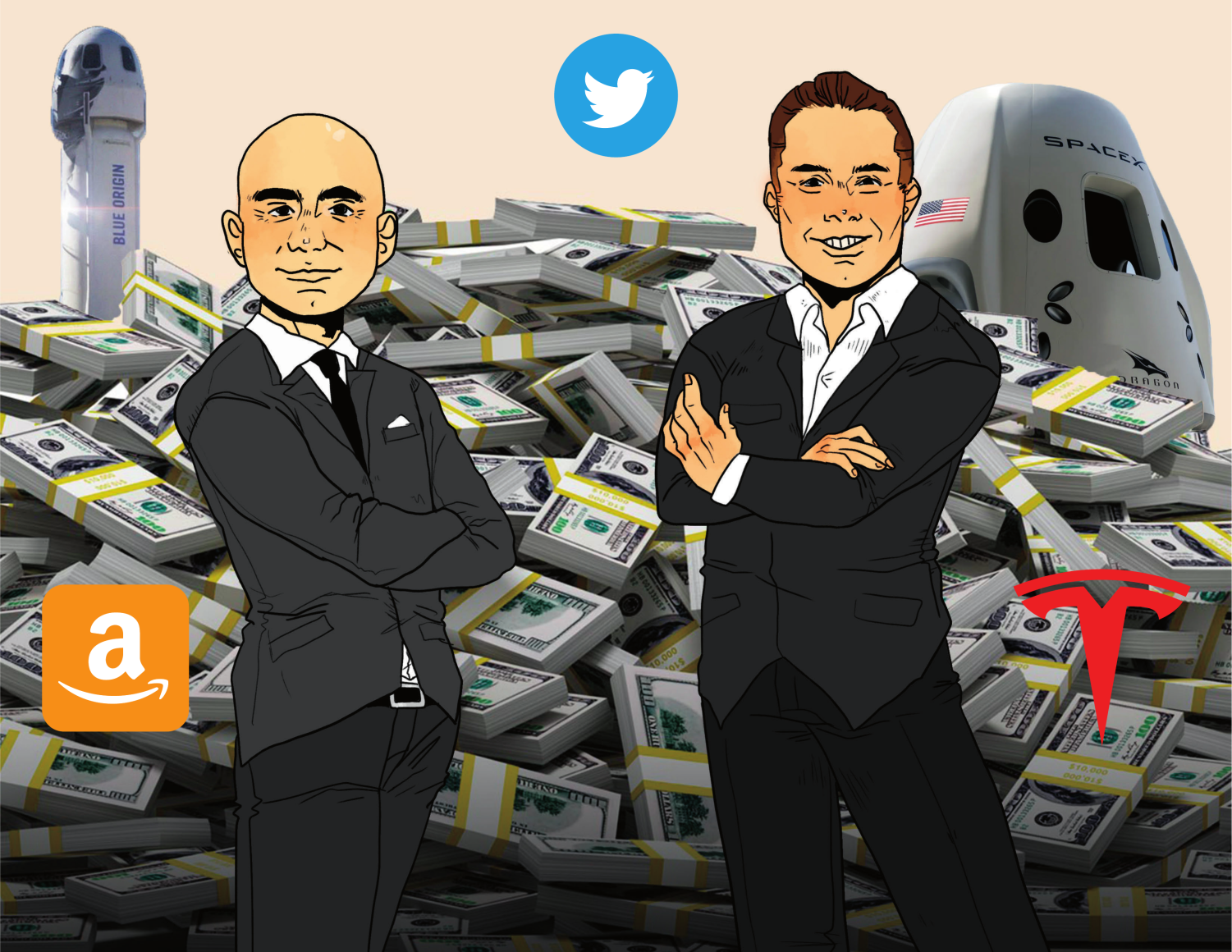In late April, news of a possible purchase of Twitter by Elon Musk got a lot of attention, considering the contentious relationship the world’s richest man has had with the social media company.
In a brief two week period, Musk, who has been known to troll Twitter executives for its business practices, first quietly became the company’s largest shareholder, turned down a spot on the company’s board of directors and then cobbled together a hostile takeover plan to buy the company and take it under private ownership. While Musk said the deal was paused on May 13, the takeover could still happen.
Musk is not the only wealthy tech titan who often makes news with his personal and business activities. Amazon founder Jeff Bezos often faces criticism for his actions as it relates to environmental impact concerns, working conditions, and union-busting. These wealthy figures have the power of money on their hands and have the potential to manipulate markets with just a statement on social media.
According to Forbes business magazine, Musk is the world’s richest person with a net worth of an estimated $221.5 billion while Bezos comes in at second place with $171 billion. Their wealth alone often makes them the target of criticism from working-class people who don’t like seeing so much wealth being concentrated in the hands of just a few people. There has also been government intervention and investigation focused on their corporations.
The environment on Twitter regarding this new business deal is divided. Division starts primarily on whether or not Musk is an information-age messiah as some people view him to be. Musk often promotes himself as a savvy investor, and he has developed a following of business-related social media accounts praising the billionaire and using his quotes in their posts.
Musk has also promoted the usage and buying of cryptocurrency, especially with a venture known as Dogecoin. To promote the currency, Musk encouraged his audience to buy the currency using memes, and tweets referencing the currency. As a consequence, he gained popularity within the cryptocurrency community. While to some it seems like Musk is a lucky businessman, others view him as a corporate overboss with a monopoly in the works.
Bezos also faces criticism for his promotion of space tourism through his company Blue Origin, which sells seats to the highest bidder on rocket ships that give passengers a brief experience of zero gravity space flight. Blue Origin also prides itself as being a “benefit of the Earth” on their website, along with making its mission to increase space accessibility with reusable rockets.
Critics of Bezos make the argument that he is launching rockets into space just for fun while people who were working in Amazon warehouses have come forward with testimonies of mistreatment, low wages, unsafe working conditions, and union-busting tactics deployed by higher-ups.
Amazon warehouse workers in Staten Island, New York have formed the Amazon Labor Union in response to poor working conditions and treatment. After an against-all-odds victory to unionize, Amazon has pushed back against any forms of defiance with anti-union websites, anti-union posters, and anti-union seminars plastered around their warehouses for the workers to encounter on a daily basis. Amazon has also published an anti-union website when Staten Island Amazon workers started unionizing where infographics about unions are shared. While the first warehouse that started unionizing won the vote to unionize, a second warehouse that was voting to unionize in Staten Island lost the vote.
Antitrust cases against big tech companies are not new. In fact, Microsoft dealt with an Antitrust case, in which it ultimately lost the case. The judge ordered Microsoft to be broken up, but the company appealed the decision, and the suit ended with a settlement with the U.S. Department of Justice. The settlement stated that Microsoft wouldn’t break up if Microsoft shared its computing interfaces with other companies.
In recent years, Big Tech companies are being hit with a record amount antitrust lawsuits,including Amazon. For example, The Wall Street Journal reported that Amazon used seller data to launch competing products and put those smaller sellers out of business. During the July 2020 Congressional antitrust hearings, U.S. Rep. Pramiya Jabral asked about this report. Bezos responded “I can’t answer that question yes or no. What I can tell you is we have a policy against using seller-specific data to aid our private label business, but I can’t guarantee that policy has never been violated.” Bezos was also asked about smaller sellers being blocked from selling entire books on the website. In which he replied, that “I do not think that’s systematically what’s going on.”
Musk’s potential takeover of has generated a fair amount of controversy, considering the role the social media platform has in sharing information especially when it comes to politics. The conversation revolves around whether or not Musk would reverse decisions to ban certain accounts that promote right-wing misinformation, including former President Donald Trump.
Former President Donald Trump was banned from Twitter because of his remarks that led up to the January 6 Capitol attack. Twitter moderators took down some of Trump’s tweets and ultimately made the decision to permanently take down Trump’s account from the platform “due to the risk of further incitement of violence.”
It remains to be seen what will come out of Musk’s proposed purchase of Twitter and his proposal to unban the accounts, as he believes that “Permanent bans just fundamentally undermine trust in Twitter.” People may speculate what the environment will look like in this platform or in any other platform if other rich figures decide to follow suit. For now, it remains to be seen what their legacy will be, but it is clear that their actions can have major implications for American everyday lives.




